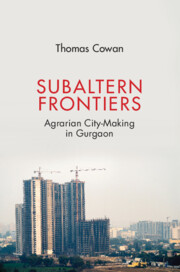1 - The Experiment
Published online by Cambridge University Press: 12 August 2022
Summary
THE ROOTS OF THE GURGAON MODEL
This chapter explores the prehistory to Gurgaon's contemporary agrarian urbanisation, highlighting how neoliberalism on India's urban frontier is realised as an outcome of attempts to graft market-driven governance onto extant class, territorial and institutional settings. Studying a forebearer to neoliberal urban India reveals neoliberalism's earthbound mediations, an incoherent ideological project compromised by the territorial and institutional alliances brokered to make space for capital on the edge of the national capital. Agrarian city-making in the twenty-first century has relied upon class projects that include the landowning peasantry into property and labour markets. But how were such class projects forged? How did certain rural populations become dominant? And why were they so easily conscripted to sell themselves and their lands into urban economy from the 1980s? In this chapter I explore how the articulation of capitalist uneven development, liberalism and caste came to structure social formations favourable to the Gurgaon model.
Gurgaon's urbanisation holds many of the characteristics of neoliberalism: financialised real-estate-led urbanisation; elite propertied citizenship; secessionary, privatised governance and infrastructural development; and a celebration of entrepreneurialism and liberal capitalism form the backbone of Gurgaon's story. And yet underwriting this façade is not only mass state-facilitated investment but also the yoking of land and labour markets to agrarian institutions and class compositions configured under colonial and post-colonial agrarian modernisation. The Gurgaon model, this chapter argues, is characteristic of what Brenner, Peck and Theodore call ‘actually existing neoliberalism’, the coming together of neoliberal actors and logics with local institutions and processes in ways that enable market-driven growth while giving space to quite other political-economic and spatial logics.
In this chapter I will move across three key moments that were foundational to the making of Gurgaon as a frontier for urban real estate capital. The chapter begins by outlining the infrastructure of the ‘Gurgaon model’ and discusses the model's early roots in pre-liberalisation Haryana. It was the repurposing of Nehruvian-era planning controls by pro-liberalisation politicians that gave the model its form and presages many of the neoliberal economic reforms of the 1990s and 2000s. I argue that the model's relative success has been dependent upon pre-existing social and economic conditions forged through colonial and post-colonial agrarian development.
- Type
- Chapter
- Information
- Subaltern FrontiersAgrarian City-Making in Gurgaon, pp. 43 - 86Publisher: Cambridge University PressPrint publication year: 2023



